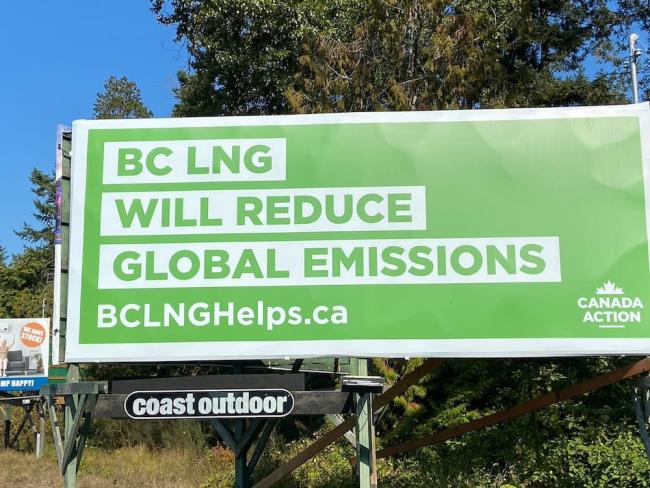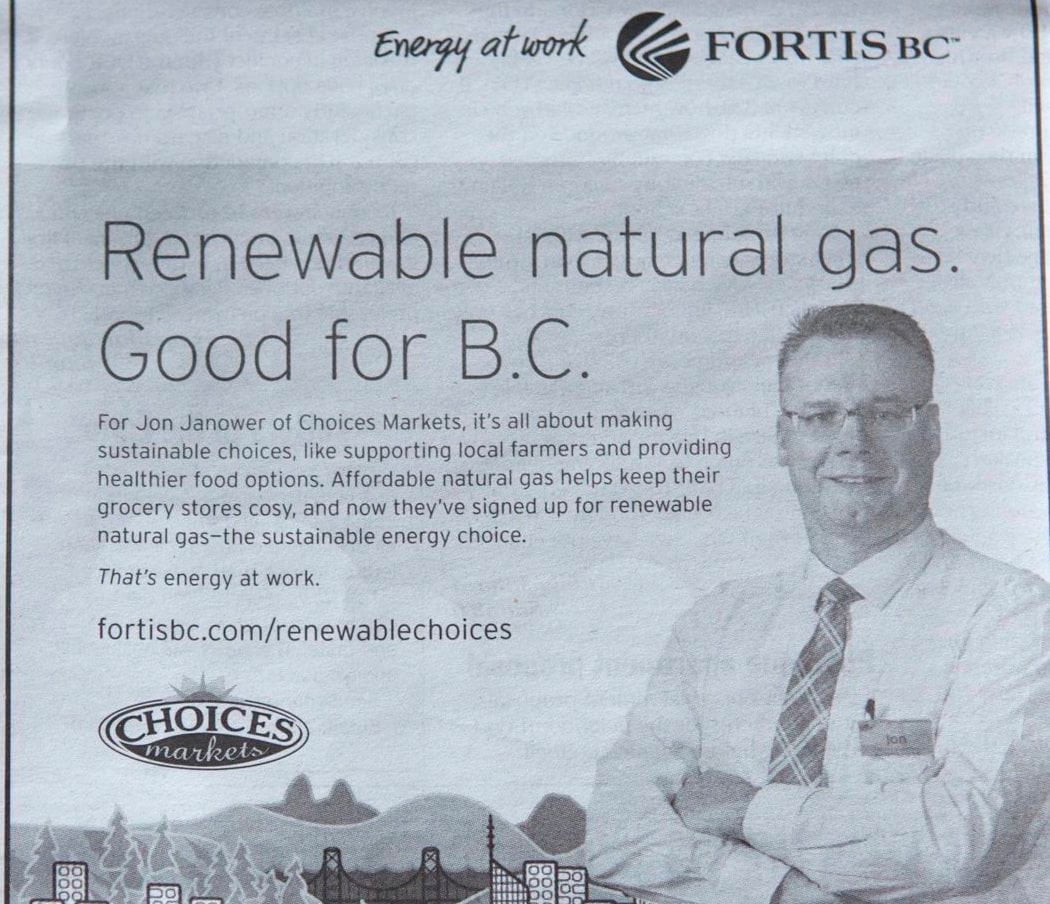Articles Menu

Jun. 26, 2024
For Ed Wiebe, seeing prominent ads claiming that “B.C. LNG will reduce global emissions” while on his daily bike ride to work as a climate researcher was particularly galling.
Wiebe wasn’t alone.
According to the Canadian Association of Physicians for the Environment, or CAPE, “multiple” anonymous complainants believed the ads were misleading and asked Ad Standards Canada to investigate. Wiebe confirmed to The Tyee that he was among them.
But Wiebe may never learn the outcome of his complaint. He has been cut out of the process after another complainant leaked an initial decision, which unanimously found the ads by industry advocacy group Canada Action Coalition gave an “overall misleading impression that B.C. LNG is good for the environment, amounting to greenwashing.”
Canada Action Coalition said it is appealing the decision.
While the decision is under appeal, complainants were asked to keep the initial decision confidential, Wiebe said. He doesn’t know who leaked the document, which was posted to CAPE’s website. CAPE health and economic policy program director Leah Temper told The Tyee the organization was not a complainant.
Ad Standards, a national non-profit tasked with self-regulation for the advertising industry, announced after the document was leaked that it would no longer engage with the complainants or make the outcome of its investigation public.
That’s frustrating for Wiebe, who was not responsible for the breach. He learned he’d been cut out of the process through media reports, he said.
He has mixed feelings about the breach itself. While he welcomes media attention to the issue, he fears it could affect transparency around future complaints.

Ad Standards normally makes decisions public only when a complaint is substantiated. It will then ask the advertiser to stop running the ads and could contact advertising platforms and Canada’s Competition Bureau if the advertiser doesn’t comply.
“It doesn’t really amount to much in terms of punishment or the public being aware that something was wrong,” Wiebe said. He believes stronger regulations are needed.
Wiebe is familiar with the Ad Standards process. In 2017, he filed a complaint against FortisBC over its ads claiming “renewable natural gas” is “good for B.C.”
In its decision, Ad Standards found that FortisBC’s failure to explain that “renewable” referred to biogas — a product of decomposing organic waste — left the false impression that conventional natural gas is renewable.
The ads had already been withdrawn when the decision was issued and FortisBC agreed to amend future advertising, the decision said.

Pressure mounts
Both the federal government and B.C.’s provincial government are facing increased pressure to put an end to misleading fossil fuel advertising.
In February, Charlie Angus, NDP MP for Timmins-James Bay, introduced Bill C-372, the Fossil Fuel Advertising Act. Citing the 2021 deadly heat dome in Vancouver and last year’s wildfire season — the worst on record — the bill would prohibit the promotion of fossil fuels, particularly ads that are “false, misleading or deceptive.”
In April, BC Green Party Leader Sonia Furstenau introduced similar legislation, Bill M209, which also targeted greenwashing by the oil and gas industry.
Responding to Furstenau in the B.C. legislature, Premier David Eby pointed to existing legislation — the Business Practices and Consumer Protection Act and the federal Competition Bureau — as avenues to address misleading advertising. The premier’s office did not respond to The Tyee’s questions about whether it would consider more stringent regulation targeting false claims by the fossil fuel industry, but forwarded the request to the Ministry of Energy, Mines and Low Carbon Innovation.
“The issues of potentially misleading claims by the fossil fuel industry are something the federal Competition Bureau is looking at, and the federal government is considering amendments to the Competition Act to specifically deal with corporate greenwashing,” a spokesperson for the ministry wrote.
“The province is supportive of the steps being taken at the federal level. Consumer Protection BC is reviewing how greenwashing relates to our existing laws.”
While neither bill made it past first reading, the federal government recently made amendments to Bill C-59, the Fall Economic Statement Implementation Act, 2023, including measures aimed at preventing greenwashing by requiring corporations to provide evidence of environmental claims.
Supported by the Liberals, NDP and Bloc Québécois, Bill C-59 passed its second reading in the senate on June 4, just as the United Nations urged governments to ban advertising from fossil fuel companies.
Late last week, in response to Bill C-59, the Pathways Alliance, which represents Canada’s six largest oilsands companies, completely removed oilsands-related content from its website and social media feeds, replacing it with a notice about the legislation.
On June 5, World Environment Day, UN Secretary-General António Guterres gave a special address on climate action and called on governments to ban fossil fuel advertising.
“Many in the fossil fuel industry have shamelessly greenwashed, even as they have sought to delay climate action — with lobbying, legal threats and massive ad campaigns,” Guterres said. “Many governments restrict or prohibit advertising for products that harm human health, like tobacco. Some are now doing the same with fossil fuels.”
While Wiebe supports the Ad Standards process (“It’s slow and weak, but it is what we have,” he said), he also believes governments need to step in with stronger regulations, given the severity and impacts of climate change. He said there’s plenty of evidence that “dark money” from fossil fuel companies is being used to spread climate misinformation.
“The evidence is there that this money is being spent to sway people’s understanding of climate change,” he said. “I think it needs to stop. I would support a bill to say — like cigarette advertising — that fossil fuel advertising is harmful, so it should be stopped.”
Wiebe added that he doesn’t know where the funding originated for the recent Canada Action Coalition ads seen on city buses, billboards and social media.
The organization describes itself as “grassroots.” However, it has established ties to the oil and gas industry and an ad campaign budget that averages more than $1 million a year
[Top photo: Following an investigation, Ad Standards Canada described claims that BC LNG would reduce global emissions as ‘greenwashing.’ The interim decision is being appealed. Photo by Ed Wiebe.]